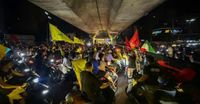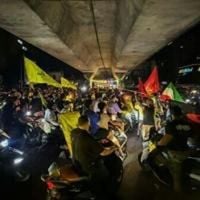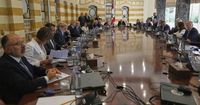On September 5, 2025, a dramatic cabinet session in Beirut exposed the deepening rift at the heart of Lebanon’s political system. As the government pressed forward with American-backed plans to disarm Hezbollah, five Shiite ministers—including representatives from Hezbollah and its allied Amal movement—stood up and walked out. Their exit, reported widely by local media, came just as the army chief was about to present a draft disarmament plan, underscoring the fierce opposition among Lebanon’s Shia political factions to what they see as an existential threat.
According to reporting from multiple agencies, this was not the first time such a protest had disrupted the government’s fragile consensus. In fact, it marked the third walkout by Hezbollah and Amal ministers over the disarmament issue since the plan was first floated. Lebanon’s multi-confessional power-sharing arrangement, which relies heavily on consensus between Shias, Sunnis, Christians, and Druze, has rarely looked so precarious.
The backdrop to this latest crisis is a surge in Israeli airstrikes on southern Lebanon. Over the two days prior to the cabinet session, at least five people were killed in the south, according to the health ministry and the state-run National News Agency. The violence has heightened tensions and, for many Lebanese, reinforced the sense that Hezbollah’s arsenal remains a vital bulwark against Israeli aggression. The group, after all, has a storied history of resisting Israeli incursions, forcing withdrawals in 2000 and 2006, and maintaining a presence in the disputed Shebaa Farms region since 1967.
The disarmament plan itself has been years in the making but gained new urgency in August 2025. Under pressure from Washington—and in the shadow of Israeli military action—the Lebanese cabinet instructed the army to produce a detailed roadmap for placing all weapons under state authority by the end of 2025. The move was framed as part of implementing a US-brokered ceasefire signed in November 2024, which ended more than a year of hostilities between Hezbollah and Israel.
After the September 5 session, Information Minister Paul Morcos announced that the Lebanese military would begin implementing its plan to disarm Hezbollah, though he was quick to temper expectations. "The Lebanese army will begin implementing the plan, but in accordance with the available capabilities, which are limited in terms of logistics, material and human resources," Morcos told journalists, as reported by AFP. He added that the army would provide monthly reports to the cabinet on its progress, but the details of the plan would remain confidential for now.
For Hezbollah and its allies, the government’s direction is nothing short of a betrayal. Earlier in August, the group’s parliamentary bloc denounced the cabinet’s decision as "unpatriotic" and called for its reversal. By mid-August, Hezbollah Secretary General Sheikh Qassem was warning that the decision was "dangerous" and could plunge Lebanon into "a very serious crisis." In a pointed address, he declared, "This government is serving the Israeli project, knowingly or not. If you feel helpless, let us face the enemy ourselves. We don’t need you to engage." Qassem’s words, widely circulated by Lebanese media, captured the existential anxiety felt by many in the Shia community.
Critics of the disarmament plan argue that it is less about peace and more about weakening Hezbollah’s role as a deterrent force. They see the scheme as a US-Israeli project aimed at shifting the balance of power in Lebanon and the wider region. Yet for supporters of the plan—many of them from other sects or those weary of endless conflict—the move is a necessary step toward restoring full state authority and ending the era of non-state militias.
Prime Minister Nawaf Salam, speaking in late August, made clear the government’s determination to press ahead. "The path of monopolising arms, extending state authority and monopolising decisions on war and peace is a path that has begun and there is no turning back," he stated. His words were echoed in the streets of Beirut, where posters featuring Salam and President Joseph Aoun declared: "We are all with you. One army, one arsenal, one state. A new era for Lebanon."
The government’s commitment is rooted in a US proposal delivered by envoy Tom Barrack in August, which outlined both the timetable and the mechanism for dismantling Hezbollah’s arsenal. The paper also stipulated Israel’s withdrawal from Lebanese territory as a key condition. However, Lebanese officials have noted that "the Israeli side has not yet shown any commitment" to the deal, insisting that progress on disarmament is conditional on reciprocal steps from Israel.
The walkouts by Hezbollah and Amal ministers reflect the deep unease within Lebanon’s Shia community. Many fear that disarmament will leave the country vulnerable, especially as Israeli airstrikes intensify. At the same time, the government’s push has triggered protests nationwide, with demonstrators insisting that Hezbollah’s weapons remain essential for the nation’s defense.
Public opinion in Beirut, as in much of Lebanon, is sharply divided. Abdul Rahman Trabulsi, a 60-year-old resident, told AFP, "A solution must be found, and it is preferable that it be done in a proper manner, and that disarmament be achieved through mutual understanding." He added his belief that Hezbollah’s historical role "has ended." In contrast, 20-year-old restaurant worker Ali Khalil voiced staunch resistance: "Weapons will not be taken, it's impossible. Let them go first and fix the government and the state, then think about the weapons. If they decide today to seize the weapons, there will be a confrontation."
The stakes could hardly be higher. Lebanon’s sectarian system, forged in the aftermath of its brutal 1975-1990 civil war, has always depended on delicate power-sharing and informal consensus. Hezbollah, uniquely, was allowed to retain its weapons after the war, justified as resistance against Israeli occupation. Over time, it became the country’s most powerful political force, able to sway or disrupt governments at will. But the group has been weakened by its latest war with Israel and the loss of its key ally, Bashar al-Assad, in neighboring Syria.
Speaker of Parliament Nabih Berri, who leads the Amal movement, has called for "calm and consensual" dialogue. Yet the atmosphere in Beirut is anything but calm. With the army now tasked with implementing a controversial and logistically daunting plan, and with Israeli jets still pounding the south, many Lebanese fear that the country is teetering on the edge of a new and dangerous chapter.
As the year-end deadline for disarmament approaches, all eyes are on Lebanon’s fractious leadership. Will consensus prevail, or will the government’s gamble ignite the very crisis it seeks to avoid? For now, the only certainty is uncertainty itself—a familiar refrain in Lebanon’s long and troubled history.




